|
|
||
|
|
||
|
|
||
|
|
||
|
|
||
Proceedings of Hindu Death Ritual
by Vikas Kamat
First Online: March 18, 2002
Page Last Updated: August 15,2004
My father (homepage - tributes) was a very rational man and did not believe in blind rituals. I myself do not believe in namesake rituals, and want to do my part to eliminate dark myths and idolatry from Hinduism.Father's sudden death (he died of cardiac arrest at home) left me and my mother in deep shock. While the relatives wanted to arrange a big funeral preserving and parading the body, both my mother and I agreed that immediate disposal of father's body was both hygienic and apt for a man who lived such simple and austere life. So there was no visitation, no cold-storing of the corpse, or other fanfare. A simple and quiet cremation was arranged.. My mother went ahead and even donated my father's eyes, although he himself had no opportunity to do so.
On the ninth day (nine days symbolizing the nine
months of gestation before human birth), I tonsured my head in sacrifice,
and began my duty (known as kriya) to send father's soul to heaven.
I bathed in
a waterfall, and performed the worship of the sun facing to the East.
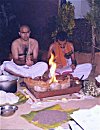 |
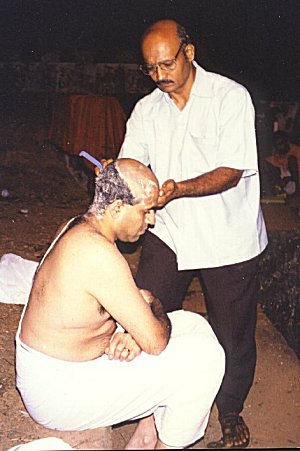 |
I re-enacted the cremation by burning father's bones, a grass replica of his body, and flowers & rice symbolizing his material acquisitions. I asked his spirit be liberated from all earthly bonding.
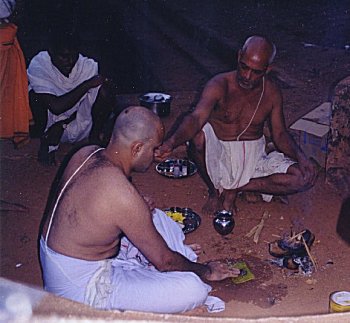
It is believed in Hinduism that the departed soul travels through the pretaloka (the world of ghosts and spirits) to the pitraloka (the heaven or the world of ancestors), and I initiated many rituals to aid the journey. The Gods were invited and offerings were made.
Specially prepared rice balls called pindas were fed to the crows, cows, and the river. The rituals continued on tenth and eleventh day of the death.
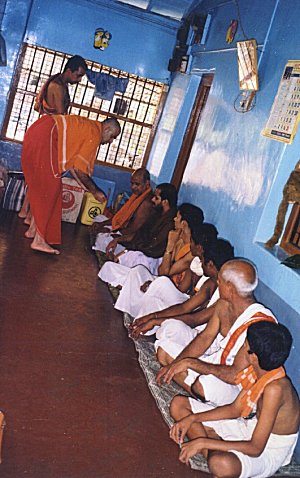
There is a belief that unfulfilled desires of the dead prevent the soul from liberating. This is indicated by the refusal of the crow to eat the pinda. I invited the crow to eat the pindas, saying that crows were my fathers favorite birds. The crows came near the food, but did not bite. The gathered relatives asked me if I knew of any of unfulfilled wishes of father. I promised publicly that I'd continue to run his website, and that I'd preserve his cameras and letters. As if they understand, lot more crows approached, but none would bite yet. The crowd exclaimed that there must be something else, and I promised to my father that I'd take good care of mother. Again, as if they heard my thoughts, the crows ate away the rice balls.
My non-believing heart had melted and I once again saluted my father's dedication to my mother.
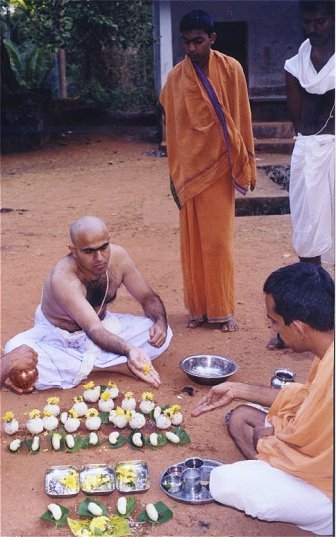
I asked that henceforth the half the fruits of my charity (or divine credits) and good work be credited to my parents. On the twelfth day, I invited the spirits of the ancestors (my grand father, great grand father, and great great grand father) into new pindas, and asked them to receive the spirit of my father, which I had initiated into a separate rice ball. Then I broke the ball that represented father, and merged it into the ancestors. This process, known as Sapindikarana marked the end of father's journey.
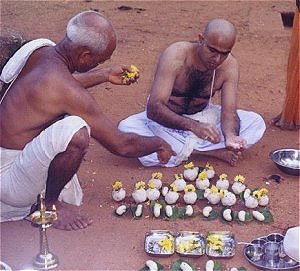
The obliging crows reported that father indeed reached the heavens!
In gratitude, I honored the brahmins by giving them gifts, and fed the
relatives. This is known as Samaradhana or celebration and marked
the end of mourning.
| The gathered relatives sang father's laurels, read
his letters, and we thanked the Lord for letting us come in contact
with a such a wonderful human being.
Throughout the process, I remembered one thing my mother told me "Shraddha, the word for last rites in Hinduism is derived from Shruddha which means religious duty or devotion. So it doesn't matter if you don't do the rituals. But whatever you do, do it with shruddha". |
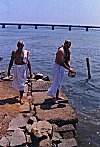 |
![]()
See Also:
- FAQ on Hindu Funerals
- The Brahmins -- Potpourri of topics on the various brahmin communities of India; includes a number of pictures and a comprehensive list of priestly communities.

Death in Hinduism |
Pictures |